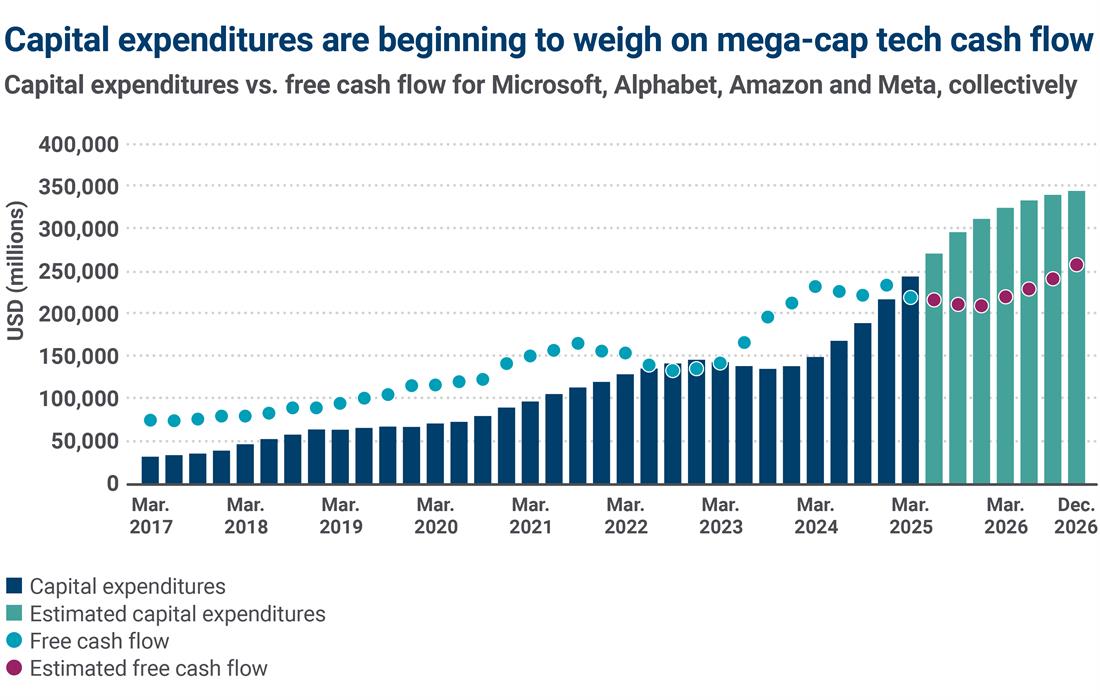The threat of tariffs has brought globalization under extreme pressure. Countries and companies are scrambling to reduce their exposure to tariffs, greatly accelerating a new cycle of deglobalization. This process will likely have significant implications for investors’ portfolios as some previously favored assets may become less attractive and others show more potential upside.
Here are three themes for investors to consider in this new era of deglobalization:
1. Bonds and real assets can help offset risk
It’s evident that the Federal Reserve will stick to its data dependent approach, avoiding forward guidance and any messaging that could be interpreted as political. Fed policymakers know that lower rates are not a cure for uncertainty, so we do not expect an interest rate cut over the near term. We see little chance that the central bank will lower rates until a major increase in the unemployment rate shows a recession is imminent.
The Fed is also reluctant to cut rates because of the risk that tariffs will push inflation higher. We are mindful of this possibility and favor exposure to inflation-protected bonds and real assets like real estate and commodities as tools to help offset inflation risk.
However, investors may want to rethink their exposure to longer term U.S. Treasuries as they could underperform amid resurgent inflation. Additionally, they face growing scrutiny from foreign investors due to concerns about fiscal sustainability and economic policy uncertainty.
2. Growth stock valuations remain elevated
In times of rapid geopolitical change, we tend to lean more heavily on asset valuations. Even after the concentrated selling pressure on growth stocks and the relative outperformance of value stocks in early 2025, value stocks appear to offer more valuation support.
In artificial intelligence (AI), the tremendous advantages of being at the forefront of change, as illustrated during earlier periods of disruption in digital media, online retail and cloud computing, appear to have flattened out. As a result, the tech giants are spending heavily on AI to maintain their dominant positions. While, we believe this spending will be profitable over the longer term, time horizon matters. These innovative firms could see their valuations challenged over the near term by flattening returns on equity as their capital expenditures are elevated (see below).

As of March 31, 2025. Q1 2017 to Q1 2025. Q2 2025 to Q4 2026 are estimates for capital expenditures and free cash flow. The specific securities identified and described are for informational purposes only and do not represent recommendations. Source: T. Rowe Price analysis using data from FactSet Research Systems Inc. These data are for illustrative purposes only, representing four mega-cap tech companies collectively. They do not represent all mega-cap tech companies. Actual future outcomes may differ materially from estimates. This is not a recommendation to buy or sell any security.
3. Trade tensions to dampen traditional U.S. equity advantage in a downturn
Typically, during an economic downturn or recession, we would expect U.S. equities to outperform international stocks. However, we believe the underlying dynamics this year may be different. Here’s why:
- Foreign central banks can more easily lower rates: One factor working against U.S. equities is the inflationary pressure from tariffs that will keep the Fed on hold unless a recession is inevitable. Outside the U.S. (and Japan, where the Bank of Japan has been gradually raising rates), central banks have more leeway to lower rates — and mortgage rates are more responsive to cuts, so the benefits flow through the economy faster.
- Planned defense spending could provide a market and economic boost: The recent landmark decision by Germany to loosen its debt brake on defense spending and create a €500 billion infrastructure fund is a dramatic change after more than a decade of austerity measures. This pivot could eventually provide a much needed fiscal boost to the European economy, which has been operating below capacity for most of the past 15 years, supporting the continent’s equity markets.
- Corporate governance reforms continue to support Japanese equities: Japan stands out among international equity markets because of its positive momentum toward stronger corporate governance. The country’s steady progress toward a healthy level of inflation and domestic consumption should also support its stock market. While exports are a major driver of Japan’s economy, making it particularly sensitive to U.S. tariffs, Japan appears motivated to negotiate with the Trump administration to lower tariffs.
How can you navigate a post-globalization world?
If you’re wondering how you can incorporate these insights into your investment portfolio, reach out to your Ameriprise financial advisor. They can review your asset allocation and diversification strategy in light of the current landscape and make personalized recommendations based on your risk tolerance, time horizon and financial goals.